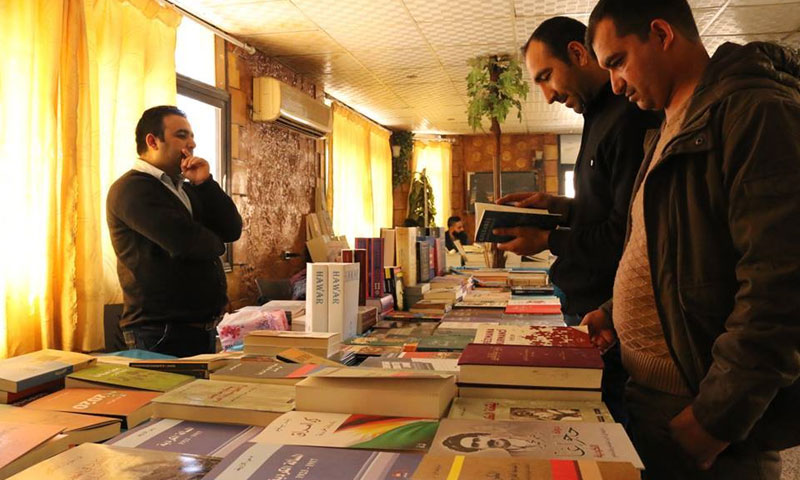



A series of book fairs is held at al-Hasakah governorate, north-eastern Syria, which the “Syrian Democratic Forces” (SDF) is in control of. The last of these fairs took place from 18 to 20 November.
The “Mobile” fair, as it moves between the governorate’s towns and villages, was held with the participation of 13 cultural foundations, the majority of which is Kurdish, with a few Syriac ones, while Arb publishing houses were totally absent. This raised questions about the fair’s goals.
Concerning the book fairs held today under the supervision and the management of the Cultural Committee of the Kurdish Management, Mohammad Ibrahim, a Kurdish writer, journalist and novelist, based in the Jordanian Capital Amman, told Enab Baladi that “what I fear the most is that the concerned entities might prevent certain titles and impose ones that carry their mindset and that they play the diversity card with the titles but within a single frame, a thing that we do not wish for.”
Ibrahim did not deny that the fairs have several positive sides to them, being socially diverse and allow the readers to know and get closer to the culture of their counterparts and partners in the area.
He pointed out that the Kurdish reader might find a book about Assyrians in the language he/she needs and vice versa, stressing that the danger of eclectic books is not to be neglected and that playing on the cultural cord through books has a massive impact on society, its behavior and the definition of its culture and identity.
The “Self-Management,” of Kurdish majority, is in control of the area and is accused of forcing the Kurdish culture on it while marginalizing the Arab component. This has been officially refuted by the “Management,” which says that it seeks to include all the area’s ethnic components within its bodies.
The absent Arab publishing houses was not less influencing than the statements of the “Self-Management” officials and intellectuals who participated in the fair’s events.
Ahmad Husaini, a Kurdish poet and one of the fair’s participants, stressed the effect these fairs have on the Kurdish society. He said: “From my perspective, the fair is not about selling books, as much as about bringing the people closer to this intellectual weapon. We must learn our language and be informed of our Kurdish culture. It is also necessary to read books written in our mother language, and it is crucial to intellectually prepare, in a manner that exceeds the military preparation. Our enemies are fighting us with intellect more than weapons,” as quoted by the Kurdish Adar Press.
“The presence of this number of books and writers contributes in spreading the philosophy of reading anew, to be a beacon for the future generation, so it knows the amount of sacrifices offered by the area’s people,” Abdul Karim Saroukhan, the joint director of the Executive Council in Jazira, under the Kurdish “Self-Management,” said during the fair.
Saroukhan pointed out that writers and intellectuals must face all the conspiracies aiming to steal the area’s peoples’ gains, culture and distort their history, as quoted by the Kurdish Hawar News Agency.
In an interview with Enab Baladi, Bahouz Ismail, one of the book fair organizers, described these statements as irresponsible and not showing the reality of the fair.
The fair has no political or ideological intentions. It comes within the context of enhancing the reading tendency, Bahouz explained.
About the lacking Arab publishing houses, Bahouz said: “They did not show up though they have been invited. We respect their decision and their preservation for security reasons.”
During the war and the battles in the area, bookstores were generally affected, including the Arab ones, according to Bahouz, and if any libraries are yet existent, their presence is then restricted to the security square, where the regime is in control.
The “Mobile Book” Fair, under the management and the supervision of the Cultural Committee under the “self-Management”, was held several times before, the last of which was on September 25 at the city of Al-Malikiyah and at the city of Qamishli before it.
if you think the article contain wrong information or you have additional details Send Correction